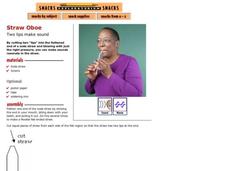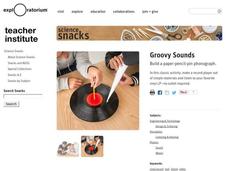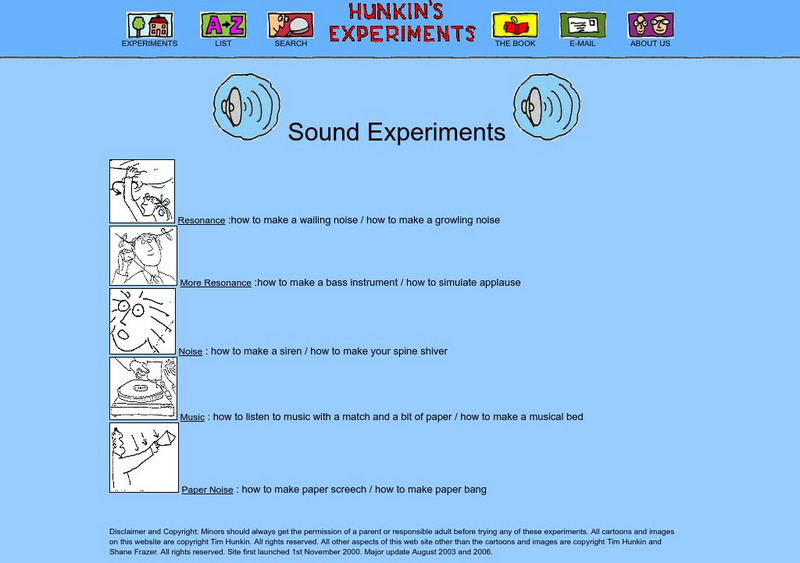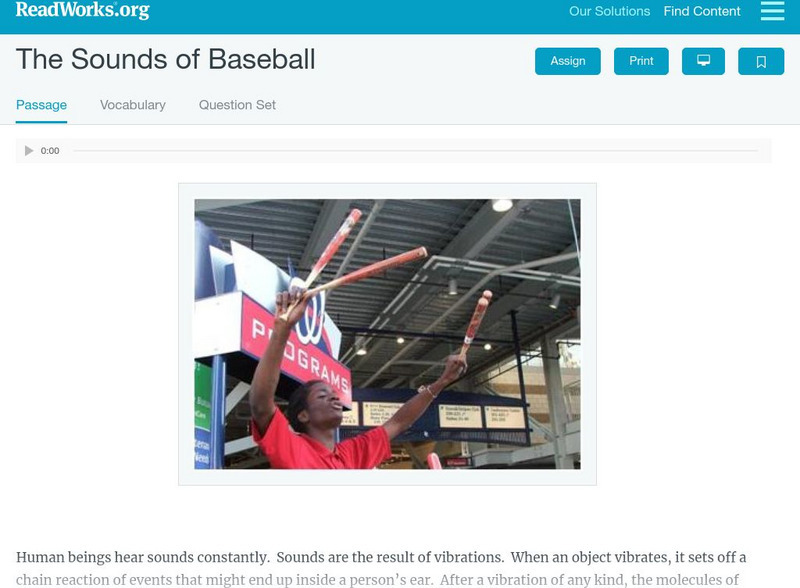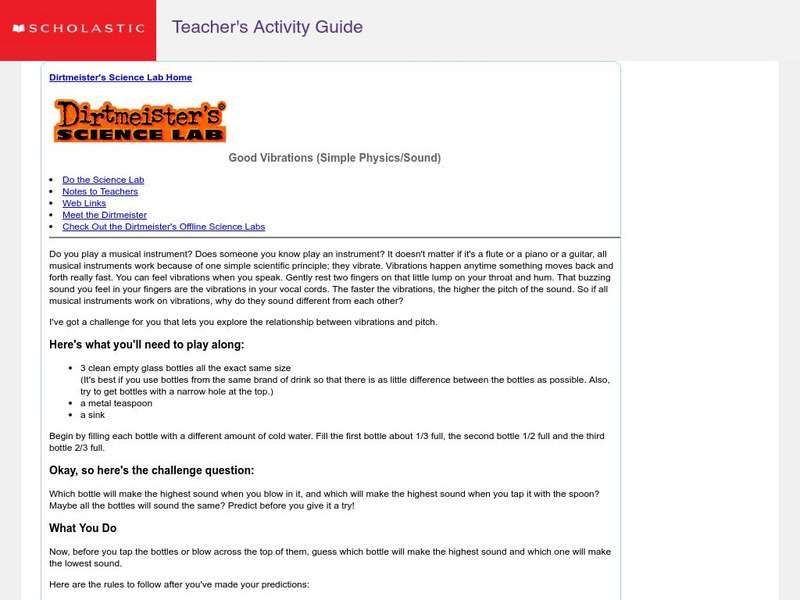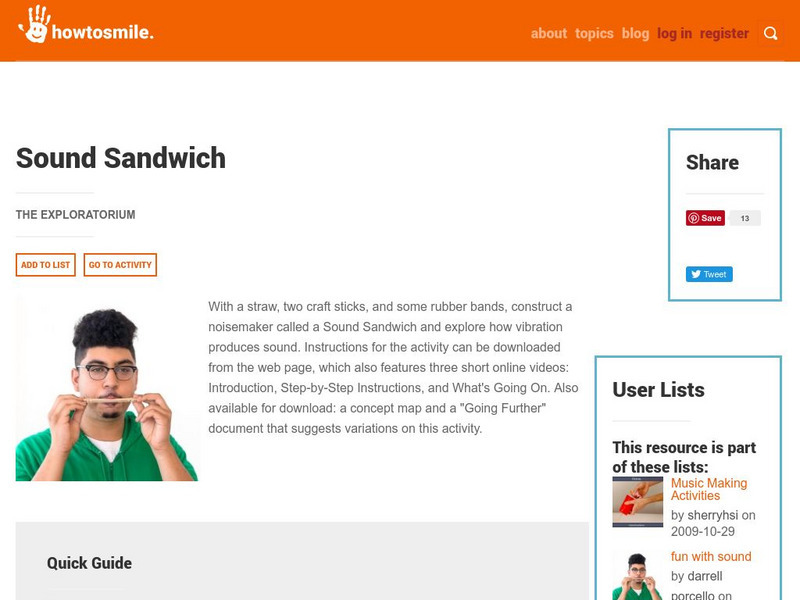Science Friday
Make a Model Eardrum to Detect Sound Waves
Make sound waves visible with an experiment that asks middle schoolers to build a model ear drum using plastic bottles, rubber bands, plastic wrap, and sand-like substances.
Exploratorium
Straw Oboe
Trim the end of a straw to construct a vibrating wind instrument. Everyone in your class can make their own during a lesson on sound waves.
Exploratorium
Groovy Sounds
Make music. Class members construct a simple record player using a paper cone and a pin. The resource provides a description of what is happening and why listeners can hear the sounds through the cone.
Museum of Science
Sound Design
Hear about a great resource on sound? An interesting hands-on activity has learners construct a device that will soundproof a phone or speaker. They test out different materials to see which ones best absorb sound waves.
Museum of Science
Sound Sandwich
Not all sandwiches are tasty. Scholars use basic materials to build an instrument called a sound sandwich. They see how blowing on the instrument causes rubber bands to vibrate, which produces sound waves.
Exploratorium
Sound Bite
Learners use their teeth for more than just eating. The activity shows class members how to send sound through their teeth by using an electric motor connected to a radio to generate vibrations. Biting on the motor...
Exploratorium
Vocal Visualizer
Make sound visible with an activity that provides directions for how to build a vocal visualizer meant to create light patterns. Making noise into the visualizer causes a mirror to vibrate, reflecting a laser beam, and creating...
Teach Engineering
Acoustic Mirrors
Investigate sound waves with acoustic mirrors. Using audio software, groups make recordings of musical instruments, both with and without acoustic mirrors. They compare the recordings to see the effect of acoustic mirrors on sound...
University of Waikato
Make and Use a Hydrophone
Using a home-built hydrophone, pupils investigate how things sound in water. Learners listen to sounds created in air and then compare that to the same sound picked up by the hydrophone. Individuals compare the loudness and the pitch of...
Smithsonian Institution
What's the Code? Coding Robot Movements Using Sound
Tap into the desire to learn about computer codes. Pupils apply the Tap Code and the Polybius Square to send secret codes using sound. They design a code that tells a robot what movements to make and then test out their code using one of...
DiscoverE
Slinky® Science
Toys are great for learning about physics. Scholars use Slinky® toys to study Newton's laws of motion and types of energy. After a little play, they then model longitudinal and transverse waves with the Slinky® toys.
Perkins School for the Blind
Name That Frequency
How cool! This plan uses old cassette tapes to show frequency from traveling vibrations. To prepare for the lesson, tactile frequency diagrams are made and then placed near the video tapes or dominoes that are already set up. When they...
Exploratorium
Resonator
Construct a demonstration apparatus for your lesson on resonance. Instructions are provided here to assemble dowels and balls into swinging objects that have different frequencies. It is a neat visual to include during your lecture if...
Science Buddies
Science Buddies: Measuring Vibrational Frequency With Light
Strike a key on the piano, and you hear the string vibrating. Just about any object vibrates when it's knocked, but how much and how fast? This project helps you find out. You'll build a simple light-sensing circuit for measuring the...
TeachEngineering
Teach Engineering: Seeing and Feeling Sound Vibrations
Students examine the existence of sound by listening to and seeing sound waves while conducting a set of simple activities as a class or in pairs at stations. Students describe sound in terms of its pitch, volume and frequency. They use...
TeachEngineering
Teach Engineering: Traveling Sound
Students explore how sound waves move through liquids, solids and gases in a series of simple sound energy experiments. Understanding the properties of sound and how sound waves travel helps engineers determine the best room shape and...
Teachers TryScience
Teachers Try Science: Musical Coat Hangers
From the National Science and Technology Centre in Australia comes this easy experiment that shows how sound waves travel and what materials are good conductors of sound.
Physics Central
Physics Central: Physics at Your Desk: Drumming Fingers
An easy experiment through which students explore sound waves while tapping their fingers on a desk or table in a quiet room.
Museum of Science
Museum of Science and Industry: Online Science: Activities: Sound Like a Turkey
An activity where students investigate the sounds created by the friction of fingers moving along a wet string.
Hunkins Experiments
Hunkin's Experiments: Sound Experiments
Hunkin's Experiments is a group of simple cartoon illustrations of scientific principles. Some would work well in the classroom, but others have little value beyond entertaining students. All of the projects are easy to do. This group of...
Read Works
Read Works: The Sounds of Baseball
[Free Registration/Login Required] An descriptive text about the sounds a person would hear at a baseball game. A question sheet is available to help students build skills in reading comprehension.
Scholastic
Scholastic: Dirtmeister's Science Lab: Good Vibrations
An experiment that explores the relationship between vibrations and pitch. This site includes web links, a challenge question, and notes to the teacher.
Other
How to smile.org: Sound Sandwich
Students discover how vibrations produce sound by making this sound sandwich out of everyday materials. Lesson plans include three videos that give an introduction, step-by-step demonstration, and an explanation of the science behind the...
Science Education Resource Center at Carleton College
Serc: Investigation of Pitch and Rate of Vibration
An inquiry lesson where students explore pitch and the rate of vibration. Students will look at how the rate of vibration which creates pitch is affected by the size of the object studied.

